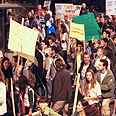

Complaints over stipends/subsidies to students in yeshivot have distorted the broader issue. The only way to know what is fair is to examine the entire picture of direct and indirect subsidies in the economy as a whole.
The problem, according to government officials, budget experts, and economists, is that work has never been done. No one has done the research; there are no studies of this critical issue!
Not only are budgets difficult to dissect, the issue of who gets what is highly political. Subsidies to universities and their students are considered "investments," since students eventually (hopefully) enter the workforce. But no one has examined if what people study has any relation to jobs they find. Many courses of study, although interesting, such as political science, sociology, history, literature and philosophy, have little practical use; moreover, in some cases, political correctness has replaced academic excellence.
If these courses are considered an important part of being "educated," why doesn't "education" include the study of Jewish sources? Why is studying philosophy in a university more legitimate than studying Talmud in a yeshiva?
If the criteria for subsidizing education are not based on what people do with it, why are yeshiva studies different from any others? Moreover, Torah studies are essential for leading a Jewish life, raising a Jewish family, and ensuring the quality of the next generation.
Accusing yeshiva students of not being productive ignores the fact that many become teachers and rabbis, serve the community, and are raising large families – essential to our demographics as a Jewish country; others go on to study in schools of higher education, and become professionals.
‘Haredim are human beings’
The Council for Higher Education will soon disperse huge budgets. Last year's budget was NIS 6.9 billion; this year it will increase. To whom will these funds go? Will colleges receive their fair share? Will reforms be implemented? The CHE has refused to release details of programs and allocations prior to their disbursement.
Subsidies to other sectors of the population and economy are also not transparent. Funds to kibbutzim and moshavim, for example, might be justified as investments in agriculture, but these subsidies are often wasteful.
Monopolies (like IEC) and cartels (like banks), also benefit from indirect subsidies, by controlling markets and prices, which are ultimately paid for by consumers. Although some think-tanks and economists have investigated this, Knesset and relevant ministries are reluctant to act.
Why should Israel Broadcasting Authority receive a billion shekel subsidy per year? Why does the Ministry of Defense subsidize Army Radio? Why should Habima Theater receive NIS 20 million a year? Or the Cameri Theater NIS 12 million? Why should actors, artists, and professors who call for boycotting Israel be subsidized, and not yeshiva families?
The Histadrut labor union federation receives indirect subsidies in the form of wage and pension agreements, which reinforce its political power and influence.
Without examining all direct and indirect subsidies and transfer payments, it is impossible to evaluate whether subsidizing needy yeshiva families is appropriate. Those who attack these subsidies miss the real problem. It's not about equity; it is about discrimination, exploitation, and systemic inequality.
As PM Netanyahu said at the Knesset on Nov. 3, 2010, "Stipends for unmarried full-time yeshiva students are something everyone is familiar with. The ultra-Orthodox are human beings, they are our fellows, and I think they should be treated as such."
Students and professors can provide a clear understanding of what is wrong with our system, and how to change it. Scapegoating haredim is no excuse for not doing serious research.
- Follow Ynetnews on Facebook















